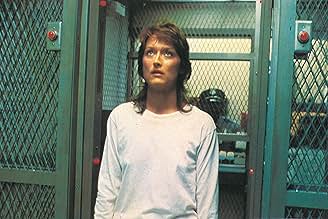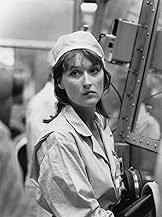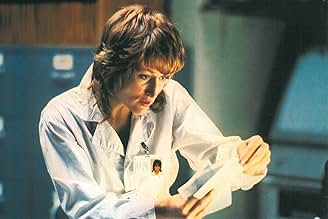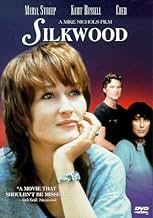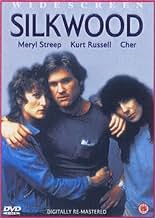Basado en un hecho real narra la historia de Karen Silkwood, una trabajadora de una central nuclear de Oklahoma, que luchó por desvelar las ineficaces medidas de seguridad de su empresa.Basado en un hecho real narra la historia de Karen Silkwood, una trabajadora de una central nuclear de Oklahoma, que luchó por desvelar las ineficaces medidas de seguridad de su empresa.Basado en un hecho real narra la historia de Karen Silkwood, una trabajadora de una central nuclear de Oklahoma, que luchó por desvelar las ineficaces medidas de seguridad de su empresa.
- Nominado para 5 premios Óscar
- 2 premios y 19 nominaciones en total
Argumento
¿Sabías que...?
- CuriosidadesThe scene where Karen sets off the radiation alarms actually happened. Her level of contamination was forty times the safe limit.
- PifiasAfter Karen's first contamination, she and Drew are at home, and Drew is laid out on the bed playing his banjo, and black (X) marks can be seen on the quilt.
These are not actor position marks, but (repeating) parts of the quilt pattern. Drew's body lining up on the marks is just chance.
- Citas
Karen Silkwood: You think I contaminated myself, you think I did that?
Mace Hurley: I think you'd do just about anything to shut down this plant.
- ConexionesEdited into The Clock (2010)
- Banda sonoraSilkwood Main Titles
Written and Performed by Georges Delerue Et Son Orchestre
Reseña destacada
I saw "Silkwood" again recently, and it seemed to make sense of the past 25 years of my life -- I finally understood why I began doing what I do.
When I was sixteen years old I broke both legs, and was out of school for two months. But twice a week my father, who worked nights as a security guard at the Kerr-McGee office building, took me downtown to the federal courthouse in Oklahoma City, to watch the proceedings of the Silkwood v. Kerr-McGee trial during morning sessions. He insisted I go, he said, "So you'll learn something." I learned a lot about people then, and about the law, and the experience certainly took my mind off my own physical discomfort.
Mr. Paul, an excellent corporate lawyer, represented Kerr-McGee, which leased the operation of the plutonium plant in Crescent, Oklahoma, about thirty miles north of here. Mr. Spence represented the children of Karen Silkwood. Mr. Paul and his six associates seemed to change their suits every day. Perhaps they didn't want to see like the "great gray wall" -- which was the stereotype of corporate lawyers. But the net effect of seven men striving to seem individual was that of a great plumed serpent preparing to devour any small creature in its path. Mr. Spence, on the other hand, wore the same buckskin fringed coat each day. Each day he would place his Stetson on his table. He and the hat sat in splendid silence while the Kerr-McGee attorneys conferred and whispered.
Both men counted on the sentiments of a working-class jury. Mr. Paul figured people would recognize the contribution made to the community by Kerr-McGee, a locally owned business with world-wide influence, which provided many jobs to people here. Mr. Spence counted on them harboring deep suspicions, after having been treated like throw-away people for so many years by other employers of the same size as Kerr-McGee. My father was such a person. He worked for Kerr-McGee, but he distrusted corporate politics, and rightly figured they'd let him go right before he qualified for a pension. Later, that's exactly what happened.
Mr. Spence has sued the corporation for 2 million dollars. But the jury awarded him, and Karen Silkwood's children, five times that much. Later, thanks to an excellent foundation laid by Mr. Paul, Kerr-McGee was able to get the conviction overturned, then eventually settled for a payment of 1 million dollars to the grown children. Of course, Mr. Spence took about half of that, and after taxes, I suppose each of the three children had about enough to get a college education, or to buy a new truck and have a down payment on a house.
That's what happened to me. My father died not longer after being let go by Kerr-McGee. There was enough insurance money to pay for my college education. Then my mother died. For many years the social atmosphere in the Kerr-McGee offices, where one of my friends worked as a draftsman, prevented anyone from ever saying anything good about Karen Silkwood. I will not repeat was generally said about her, or her social life, her motivations or her politics.
I never met her, but I did see and hear the people who were for Karen Silkwood, and those who were against her, at the trial. It was clear to me that whatever else she may have been, she was a courageous person. By the time the movie was released, I was a junior in college, and suddenly changed my major to drama. After graduation, I found work with a film production company which filmed herds of cattle -- "Video Auction" was its name. Then I went to California, where I taught drama, or worked as a stage manager, for twenty years.
Watching "Silkwood" last week, for the first time in 24 years, reminded me of what the trial, and later the movie, showed me -- the part of you that lasts is what you have done for others. The lawyers will take everything else.
When I was sixteen years old I broke both legs, and was out of school for two months. But twice a week my father, who worked nights as a security guard at the Kerr-McGee office building, took me downtown to the federal courthouse in Oklahoma City, to watch the proceedings of the Silkwood v. Kerr-McGee trial during morning sessions. He insisted I go, he said, "So you'll learn something." I learned a lot about people then, and about the law, and the experience certainly took my mind off my own physical discomfort.
Mr. Paul, an excellent corporate lawyer, represented Kerr-McGee, which leased the operation of the plutonium plant in Crescent, Oklahoma, about thirty miles north of here. Mr. Spence represented the children of Karen Silkwood. Mr. Paul and his six associates seemed to change their suits every day. Perhaps they didn't want to see like the "great gray wall" -- which was the stereotype of corporate lawyers. But the net effect of seven men striving to seem individual was that of a great plumed serpent preparing to devour any small creature in its path. Mr. Spence, on the other hand, wore the same buckskin fringed coat each day. Each day he would place his Stetson on his table. He and the hat sat in splendid silence while the Kerr-McGee attorneys conferred and whispered.
Both men counted on the sentiments of a working-class jury. Mr. Paul figured people would recognize the contribution made to the community by Kerr-McGee, a locally owned business with world-wide influence, which provided many jobs to people here. Mr. Spence counted on them harboring deep suspicions, after having been treated like throw-away people for so many years by other employers of the same size as Kerr-McGee. My father was such a person. He worked for Kerr-McGee, but he distrusted corporate politics, and rightly figured they'd let him go right before he qualified for a pension. Later, that's exactly what happened.
Mr. Spence has sued the corporation for 2 million dollars. But the jury awarded him, and Karen Silkwood's children, five times that much. Later, thanks to an excellent foundation laid by Mr. Paul, Kerr-McGee was able to get the conviction overturned, then eventually settled for a payment of 1 million dollars to the grown children. Of course, Mr. Spence took about half of that, and after taxes, I suppose each of the three children had about enough to get a college education, or to buy a new truck and have a down payment on a house.
That's what happened to me. My father died not longer after being let go by Kerr-McGee. There was enough insurance money to pay for my college education. Then my mother died. For many years the social atmosphere in the Kerr-McGee offices, where one of my friends worked as a draftsman, prevented anyone from ever saying anything good about Karen Silkwood. I will not repeat was generally said about her, or her social life, her motivations or her politics.
I never met her, but I did see and hear the people who were for Karen Silkwood, and those who were against her, at the trial. It was clear to me that whatever else she may have been, she was a courageous person. By the time the movie was released, I was a junior in college, and suddenly changed my major to drama. After graduation, I found work with a film production company which filmed herds of cattle -- "Video Auction" was its name. Then I went to California, where I taught drama, or worked as a stage manager, for twenty years.
Watching "Silkwood" last week, for the first time in 24 years, reminded me of what the trial, and later the movie, showed me -- the part of you that lasts is what you have done for others. The lawyers will take everything else.
- marycadney
- 12 feb 2007
- Enlace permanente
Selecciones populares
Inicia sesión para calificar y añadir a tu lista para recibir recomendaciones personalizadas
- How long is Silkwood?Con tecnología de Alexa
Detalles
- Fecha de lanzamiento
- País de origen
- Sitio oficial
- Idioma
- Títulos en diferentes países
- Silkwood, accidente nuclear
- Localizaciones del rodaje
- Empresas productoras
- Ver más compañías en los créditos en IMDbPro
Taquilla
- Presupuesto
- 10.000.000 US$ (estimación)
- Recaudación en Estados Unidos y Canadá
- 35.615.609 US$
- Fin de semana de estreno en EE. UU. y Canadá
- 1.218.322 US$
- 18 dic 1983
- Recaudación en todo el mundo
- 35.616.970 US$
- Duración2 horas 11 minutos
- Mezcla de sonido
- Relación de aspecto
- 1.85 : 1
Contribuir a esta página
Sugerir un cambio o añadir el contenido que falta

Principal laguna de datos
By what name was Silkwood (1983) officially released in India in Hindi?
Responde

